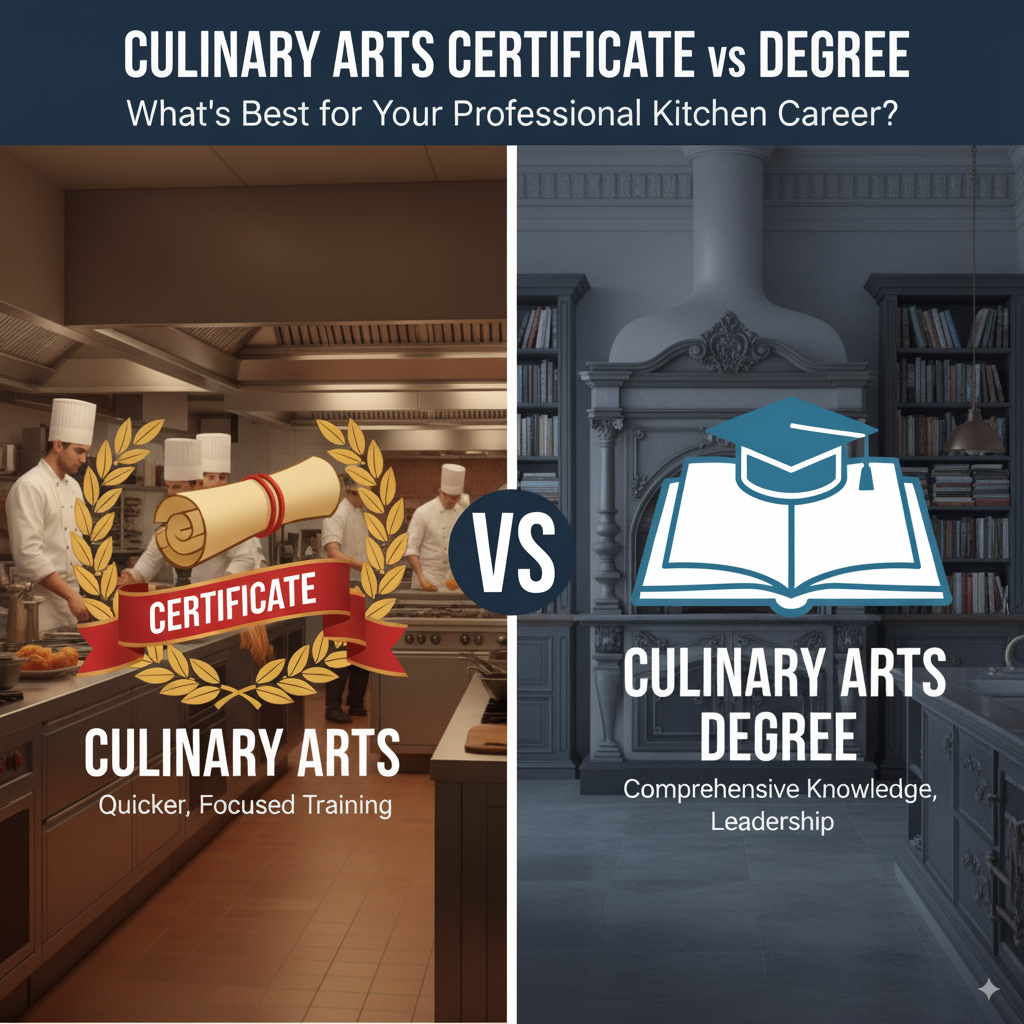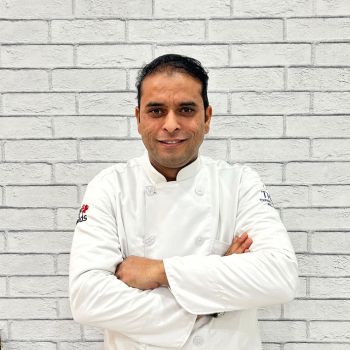

Choosing the right educational path in the culinary world can be as complex as mastering the perfect soufflé. As the food industry continues to evolve and expand, aspiring chefs and culinary professionals face a crucial decision: should they pursue a culinary arts certificate vs degree? This fundamental choice will shape not only their educational experience but also their entire career trajectory in the dynamic world of professional cooking.
The difference between diploma and degree programs in culinary arts extends far beyond the duration of study. Each pathway offers distinct advantages, challenges, and opportunities that align with different career goals, financial situations, and learning preferences. Understanding these differences is essential for making an informed decision that will serve your long-term professional interests.
In today's competitive culinary landscape, the question of which diploma or degree is better doesn't have a one-size-fits-all answer. Some successful chefs have built remarkable careers with certificate programs, while others credit their degree education for opening doors to management positions and international opportunities. The key lies in understanding your personal goals, financial situation, and the specific demands of your chosen culinary specialty.
This comprehensive guide will explore every aspect of degree diploma certificate difference in culinary education, examining duration, curriculum, costs, career prospects, and industry recognition. Whether you're considering diploma courses in cooking in Delhi or evaluating options nationwide, this detailed analysis will help you navigate the complex landscape of culinary education and make the choice that best aligns with your culinary journey.
Pro Tip: Can't decide between fast-track certification and comprehensive education? Enroll in cooking classes in Delhi to experience hands-on culinary training before making your long-term educational investment.
Before diving into the culinary arts certificate vs degree debate, it's crucial to understand the broader educational framework and what is the difference between a diploma and a degree? in general academic terms.
Certificate programs represent the most focused and time-efficient educational option in culinary arts. These programs are designed to provide specific, job-ready skills in a concentrated timeframe, typically ranging from a few months to two years. Certificates focus on practical, hands-on training that prepares students for immediate entry into the workforce.
A diploma in culinary arts offers more comprehensive training than certificates while remaining more focused than degree programs. Diplomas bridge the gap between basic skill acquisition and broader educational development, typically requiring 1-3 years of study.
Degree programs provide the most extensive educational experience, combining practical culinary skills with business knowledge, management training, and liberal arts education. These programs prepare students for leadership roles and provide the broadest career flexibility.
Certificate programs concentrate on core culinary techniques and specific skill development. Students learn fundamental cooking methods, knife skills, food safety protocols, and basic kitchen operations. The curriculum is streamlined to eliminate non-essential coursework, focusing exclusively on job-ready skills.
Most culinary certificate programs can be completed in 6 months to 2 years, depending on whether students attend full-time or part-time. The intensive nature of these programs means students spend most of their time in practical kitchens rather than traditional classrooms.
Certificate graduates are prepared for entry-level positions such as line cooks, prep cooks, kitchen assistants, and specialized roles in their area of certification. While career advancement is possible, it typically depends on on-the-job experience and additional training.
Pro Tip: Confused about which culinary path offers better career prospects? TGCA's Diploma in Culinary Arts combines certificate-level speed (12 months) with degree-level depth, including 6 months of industrial training and international internship opportunities.
Degree programs provide a well-rounded education that extends far beyond cooking techniques. Students study business principles, hospitality management, nutrition science, food costing, menu development, and often complete general education requirements.
Associate degrees typically require 18-24 months of study, while bachelor's degrees take 3-4 years. The extended timeframe allows for deeper exploration of subjects and more comprehensive skill development.
Degree graduates are prepared for a wider range of career opportunities, including management positions, executive chef roles, food service directors, restaurant ownership, culinary education, and food media careers.
Certificates: 3-18 months
Diplomas: 1-3 years
Degrees: 2-4 years
Cost Comparison:
Certificate Focus:
Certificate programs concentrate on practical skills and immediate job readiness. Students master specific techniques without extensive theoretical background or business education.
Diploma Comprehensiveness:
Diploma in culinary arts programs offer broader skill development than certificates while maintaining practical focus. Students gain industry-ready skills with some business and management foundation.
Degree Integration:
Degree programs integrate culinary skills with business education, management training, and liberal arts components. This comprehensive approach prepares graduates for leadership roles and diverse career paths.
This is a common question that reveals confusion about educational hierarchies. The answer is definitively no - diplomas are not considered degrees in the traditional academic sense, though both are valuable educational credentials.
Certificates:
Diplomas:
Degrees:
While diplomas may not carry the same academic weight as degrees, they often hold significant value in the culinary industry. Many successful chefs and restaurateurs have built careers on diploma-based education, demonstrating that industry recognition can be as valuable as academic credentials.
Certificate/Diploma Graduates:
Degree Graduates:
Certificate/Diploma Career Path:
Career advancement typically depends on experience, additional training, and demonstrated performance. Many successful chefs have climbed from entry-level positions to executive roles through dedication and continuous learning.
Common Progression:
Degree Career Path:
Degree graduates often have accelerated advancement opportunities due to their management education and broader skill sets.
Common Progression:
The Management Factor:
One of the most significant differences between certificate/diploma and degree education lies in management preparation. Degree programs specifically prepare students for leadership roles through dedicated coursework in:
Degree programs provide comprehensive business education that proves invaluable for restaurant ownership and culinary entrepreneurship. While talented chefs with any educational background can succeed as entrepreneurs, degree graduates often have better preparation for the business challenges of restaurant ownership.
Delhi, as India's capital and a major culinary hub, offers diverse educational opportunities across all levels of culinary education. The city's unique position provides access to traditional Indian cuisine techniques alongside international culinary trends.
Focus on regional Indian cooking techniques
Spice knowledge and traditional preparations
Cultural context and food history
Duration: 6 months to 2 years
European cooking techniques
Asian culinary traditions
Fusion cuisine development
Duration: 1-2 years
Pastry and baking specializations
Beverage and cocktail preparation
Food styling and presentation
Duration: 3-12 months
Combination of cooking and service training
Hotel and restaurant operations
Customer service excellence
Duration: 1-3 years
Many Delhi-based culinary institutions maintain partnerships with leading hotels, restaurants, and catering companies, providing valuable placement opportunities for graduates. These partnerships often distinguish quality programs from purely academic offerings.
Your ultimate career aspirations should heavily influence your educational choice. Consider these key questions:
Certificate or diploma programs provide fastest employment access
Lower financial investment with quicker return
Immediate practical skill application
Suitable for those who learn best through hands-on experience
Degree programs provide essential business education
Comprehensive preparation for advancement opportunities
Better positioning for corporate and executive roles
Enhanced entrepreneurship preparation
Degree programs offer crucial business management education
Diploma programs provide strong practical foundation
Consider combining diploma practical skills with business education
Experience and mentorship often matter more than credentials
If current financial limitations make degree programs unrealistic, diploma and certificate programs offer excellent value. The shorter duration means less time away from income-generating activities and lower total investment.
While degree programs require higher initial investment, they typically provide higher lifetime earning potential. Consider this as an investment in future income rather than just an educational expense.
Calculate potential earnings over 10-20 years for each educational path to understand the true financial impact of your choice.
Hands-On Learners:
Students who learn best through practical application may find diploma programs ideal, as they emphasize hands-on training over theoretical education.
Academic-Minded Students:
Those who enjoy classroom learning, research, and comprehensive study may find degree programs more engaging and suitable.
Goal-Oriented Learners:
Students with specific career targets should choose programs that align with their objectives, whether that's rapid employment entry or comprehensive career preparation.
Industry Trends:
Modern culinary education increasingly incorporates technology training, including:
Contemporary culinary education emphasizes:
For students interested in international careers, degree programs often provide better recognition abroad. Many countries have specific visa and employment requirements that favor degree-holding professionals.
Degree programs typically include broader cultural education that proves valuable in international culinary careers.
The comprehensive education in degree programs often includes enhanced communication training, essential for international opportunities.
Pastry and Baking:
Both diploma and degree options exist for pastry specialization, with the choice depending on career goals:
Progressive Education:
Many successful culinary professionals combine different educational approaches:
This approach allows students to begin earning while continuing their education.
Regardless of initial educational choice, the culinary industry demands continuous learning. Both diploma and degree graduates benefit from:
Educational Loans:
Both diploma and degree programs may qualify for educational financing, though terms and availability vary by institution and program type.
Work-Study Programs:
Many culinary schools offer work-study opportunities that allow students to gain experience while offsetting educational costs.
Industry Sponsorships:
Some employers sponsor employee education, particularly for advancement-track positions.
Short-term ROI (Diploma/Certificate):
Long-term ROI (Degree):
Additional Expenses:
The Delhi National Capital Region offers diverse career opportunities across the culinary spectrum, from traditional Indian restaurants to international fine dining establishments.
Entry-Level Salaries:
Mid-Career Expectations (5-10 years):
Senior-Level Opportunities (10+ years):
For culinary professionals interested in international careers, educational credentials play crucial roles in visa applications and employment eligibility.
While diplomas may have less international recognition, practical skills and experience often matter more in the culinary industry than formal credentials.
Study Abroad Programs:
Many degree programs offer international exchange opportunities, providing exposure to global culinary techniques and business practices.
International Internships:
Degree programs often facilitate international internship opportunities that can lead to permanent employment abroad.
Modern Educational Approaches:
Contemporary culinary education increasingly integrates digital technologies:
Technology Skills Integration:
The culinary arts certificate vs degree decision ultimately depends on your individual circumstances, career goals, and learning preferences. Neither path is universally superior,each offers distinct advantages that align with different professional objectives.
The diploma or degree which is the better question doesn't have a one-size-fits-all answer. Success in the culinary industry depends more on passion, dedication, continuous learning, and practical experience than on the specific type of educational credential.
Remember that education is just the beginning. Whether you choose a certificate, diploma, or degree, your career success will ultimately depend on your commitment to excellence, willingness to continue learning, and ability to adapt to the ever-evolving culinary landscape.
A certificate offers focused, short-term training in practical skills, while a degree provides broader culinary education, management training, and deeper industry exposure.
A culinary certificate typically takes months, making it faster, while a degree usually spans 2–4 years with more comprehensive training and career preparation.
Certificates are ideal for beginners seeking quick, hands-on entry into kitchens, while degrees suit those aiming for long-term careers in management, entrepreneurship, or advanced culinary expertise.
Employers value both, but degrees often carry greater weight for leadership, management, or teaching positions, while certificates are sufficient for line cooks, bakers, or specialty chefs.
Certificates are generally more affordable and time-efficient, while degrees require higher investment but offer wider opportunities, stronger credentials, and potential for higher salaries in the long run.

Pastry Instructor
Click one of our representatives below to chat on WhatsApp or send us an email to
info@tedcoeducation.com
Counselor
Bakery and Pastry Courses
Counselor
Culinary Arts Courses
Click one of our representatives below to chat on WhatsApp or send us an email to
info@tedcoeducation.com
Counselor
Bakery and Pastry Courses
Counselor
Culinary Arts Courses